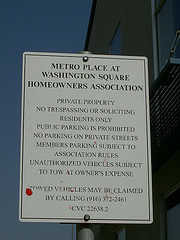California equitable easements are created by courts when, balancing the conveniences of the parties and considering the relative hardships between them, the court refuses to prohibit a nuisance or encroachment. This is the same result, though a slightly different analysis, that an implied easement. Anyone faced with a problem use, where it appears necessary for one party but unwelcome by the other, should consult with an experienced Sacramento and Placer real estate attorney. In a recent decision, a plaintiff bought property knowing that there was a road across it used to access other parcels. There was no recorded easement, so he sued to stop the use. The defendants countered to quiet title to an easement. The court said stop complaining.
 In Linthicum v. Butterfield, the plaintiff bought parcel One in what was originally National Forest land. Prior to that, the Forest Service granted a special use permit to the owner of parcels two through ten to build an access road across parcel One, which was still owned by the Feds. Through a number of transactions, other people eventually owed Two through Ten, the Feds sold One, and the Plaintiff ended up with One. The Special Use Permit had not been transferred to the new owners of Two through Ten, but the Forest Service considered it still valid, though needing to be transferred. Owners of Two through Ten had used the road for possibly 60 years to access their property.
In Linthicum v. Butterfield, the plaintiff bought parcel One in what was originally National Forest land. Prior to that, the Forest Service granted a special use permit to the owner of parcels two through ten to build an access road across parcel One, which was still owned by the Feds. Through a number of transactions, other people eventually owed Two through Ten, the Feds sold One, and the Plaintiff ended up with One. The Special Use Permit had not been transferred to the new owners of Two through Ten, but the Forest Service considered it still valid, though needing to be transferred. Owners of Two through Ten had used the road for possibly 60 years to access their property.
At trial, testimony about building an alternative route across much steeper land would require a 40 foot high retaining wall and moving 40,000 cubic yards of earth (i.e. very expensive.). The Judge did a site visit, and said the existing road was the only access, and quieted title in the easement.




 Partnership agreements generally have a
Partnership agreements generally have a  In
In  In
In  1. Original lender holds both first & second, forecloses on first.
1. Original lender holds both first & second, forecloses on first. In
In  While the principals were overseas, Chang, the lender, successfully foreclosed the deed of trust and became owner of the 25% interest in the property. To further collect on the balance of the money owed by Mali, the Lender sued her. Mali had CFI assign to her “all of its right, title, interest, and standing to bring suit, to, in, and on, any and all claims and causes of action which it has against Chen…” Mali then filed a cross-complaint against the Lender for wrongful foreclosure & slander of title. However, Mali had to dismiss her claims just before trial, because CFI’s corporate status had been suspended, and thus had no power to pursue legal actions- as a result, the assignment of claims to Mali was void. Mali assigned the claims back to CFI.
While the principals were overseas, Chang, the lender, successfully foreclosed the deed of trust and became owner of the 25% interest in the property. To further collect on the balance of the money owed by Mali, the Lender sued her. Mali had CFI assign to her “all of its right, title, interest, and standing to bring suit, to, in, and on, any and all claims and causes of action which it has against Chen…” Mali then filed a cross-complaint against the Lender for wrongful foreclosure & slander of title. However, Mali had to dismiss her claims just before trial, because CFI’s corporate status had been suspended, and thus had no power to pursue legal actions- as a result, the assignment of claims to Mali was void. Mali assigned the claims back to CFI. In
In  In
In  In
In